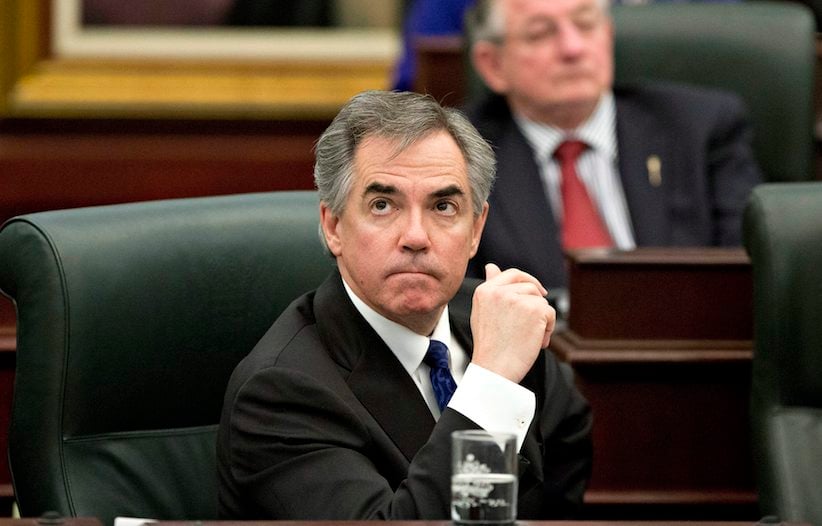Jim Prentice calls an election in Alberta. Now what?
Colby Cosh on the forces at play in Alberta
Share

Listen to Colby Cosh read his columns, or subscribe to Maclean’s Voices on iTunes or Stitcher for on-the-go listening:
On April 7, Jim Prentice called an election for May 5. Prepare for the election with our online hub for everything on the 2015 Alberta election.
Jim Prentice was confronted with a tough strategic choice when he took on Alberta’s Progressive Conservative leadership last year and oil prices promptly tumbled. Should he call a general election right away on a necessarily tough, straitlaced budget, and try to buy time before Alberta plops into a possible recession? Or should he give people time to get over his distasteful array of tax and user-fee increases, going to the country in 2016 when economic conditions on the ground might be even worse?
On Tuesday the open secret became official: the Alberta premier is taking Door Number One. The commitment quickly became irreversible, for the PC party had put its nominating process on fast-forward and ordered candidates to be ready for battle in late April or early May. Candidate offices have already been popping up in the cheap strip malls of the major cities. Putting it all on hold for another year would have been mighty expensive.
And not so hot for party morale, either. Tory MLAs in Edmonton are already counting spots on the lifeboat after a string of strong poll results in the city for the New Democrats. There will already be a cost to Prentice’s disregard for fixed-date election legislation. Complying with that piece of tissue-thin paper now would have been the worst of both worlds.
Related reading: Alberta’s resource revenue picture is downright bleak (Andrew Leach)
In obvious ways the government is right to seize the day. Last autumn’s flight of 11 members of the 16-person Wildrose opposition to the government benches left the rump party even weaker than those numbers suggest. The defectors mostly took the Wildrose’s biggest electoral majorities with them, and of those who stayed loyal, the recognized stars were interim leader Heather Forsyth and northern MLA Shayne Saskiw. Both have now dropped out of the electoral hurly-burly.
That brought forward an unexpected messiah: Brian Jean, the Fort McMurray businessman who served parts of four terms as a Conservative MP in the tarsands city. Jean resigned his parliamentary seat outright in January of last year, a decision whose suddenness initially left hurt feelings in federal Conservative circles. It turned out Jean’s son Michael was fighting a terrible illness, eventually diagnosed as lymphoma. When Jean announced his candidacy for the permanent Wildrose leadership in February, he said he was motivated partly by the “shocking” treatment his son had received in Alberta hospitals. Michael died March 20, and Jean suspended his campaign, but still won the leadership handily eight days later.
A couple of recent robo-polls nobody really believes have the Wildrose nearly at parity with the PCs provincewide. By contrast, Environics’ February numbers, with the PCs at 46 per cent and the WRP at 16 per cent, were put together by grownups—but may no longer apply. The party emptied its financial coffers trying to seize opportunity in 2012, but fundraising has remained surprisingly respectable, even into the first quarter of 2015.
Related reading: The last of Danielle Smith (Colby Cosh)
An old hand like Jean should be good at squeezing donors for cash, and he brings the possibility of vote gains in northern Alberta resource towns like his own, where the Wildrose was shut out last time. Reconciling a critique of Alberta healthcare with leading a low-tax party will be trickier.
On the left, the election will go a long way to deciding whether Albertans can finally rally behind one or two parties of the left. The Liberals have a caretaker leader, David Swann, and the most experienced politician left in the party, Laurie Blakeman, has accepted multiple party nominations in her Edmonton Centre riding. She is formally the Liberal-Alberta Party-Green candidate, although she will appear on the ballot only as a Liberal. Blakeman should win Centre handily; the question is whether any other Liberals will be left to caucus with her, and which ones. There would seem to be a pretty natural and direct path to a merger of the parties she represents—if she can persuade the province’s geriatric Liberal base, ever reluctant to part with their old brand, to go along with it.
For now some of that traditional Liberal vote is bound to flip to the hale and hearty New Democrats. Rachel Notley’s party is expected to add to its total of four Edmonton seats, and has a strong chance in Lethbridge-West. For a breakthrough greater than that, the NDP must count on the serendipitous appearance of an elusive Canadian political creature: the Conservative-New Democrat vote-switcher.
Believe it or not, this enigmatic beast might just exist in large enough numbers to be a force in this Alberta election. Alison Redford’s PCs turned their campaign around in 2012 by terrorizing young urban voters about the prospect of a gay-bashing Bible-hugging Wildrose government. The result was, well, Alison Redford. So that particular trick is probably not available anymore.